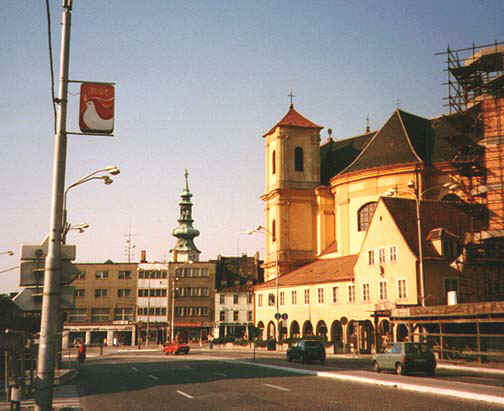
For two years in the mid-1990s, after Slovakia became an independent republic, Alice Gingold served as a Peace Corps volunteer in Zvolen, teaching about modern business practices, serving as an adviser to the local government and helping to build a playground
Jewish Life Rises From A Cemetery
Steve Lipman
Alice Gingold would walk by the Jewish cemetery every day on the way to work. For two years in the mid-1990s, after Slovakia became an independent republic, Gingold served as a Peace Corps volunteer in Zvolen (population 44,000), teaching about modern business practices, serving as an adviser to the local government and helping to build a playground.
The cemetery, in ruins, was on the route from her apartment to City Hall. She didn’t go in.
“I knew I would be terribly upset,” said Gingold, who worked as a commercial Realtor in southern New Jersey. Finally she entered with a friend. “We stood there and we both cried. It was overgrown with weeds, totally desecrated. There wasn’t a stone standing. It was a nightmare.”
Gingold, who was raised in an assimilated Jewish family in Vienna and immigrated to the United States in 1938, decided to take charge of repairs. The municipality and the national government were cooperative.
Back in the U.S., she raised $7,000, which she sent to Joseph Klement, a marketer in Zvolen who was in charge of the project. In 1998 she returned for a two-day dedication ceremony that featured government officials and an army band. The burial grounds, including a memorial for 128 Jews killed during the Holocaust, was cleaned up, and a new stone wall was built around the perimeter.
“It looked like a cemetery,” she said. Now it’s a national historical landmark. But what about Zvolen’s Jewish community?
Gingold had met some of the town’s five dozen or so Jews, and some in nearby Banska-Bystrica during her stay there. Energized by the cemetery dedication, they expressed interest in Judaism but, like most Jews in once-communist Eastern Europe, knew nothing about the religion.
Gingold turned to her rabbi, David Weis, of Congregation Beth Israel in Northfield, N.J. Project Rebirth: A Revival of Judaism and its Heritage in Slovakia was born.
“One prayer and one holiday at a time,” Gingold said, she and Rabbi Weis sent information — prayers, recipes, music — about Jewish practice to Klement, de facto leader of the community. The material was translated into Slovak. The rabbi continues to answers questions from Zvolen’s Jews via e-mail.
“She gave us an opportunity to see modern Judaism,” Klement said. “We feel wonderful.”
“There exists now a growing, totally self-sustaining Jewish community, and people travel great distances to participate in joining together for celebrations,” said Gingold, who calls Zvolen’s small Jewish community “typical” of the scores that remain in the former Eastern Bloc — cut off from Judaism, “they want to learn.”
Zvolen’s Jews meet in a formerly Jewish building returned by the municipality.
“Out of the ashes of the cemetery we’ve become a Jewish community,” Gingold said. And the community holds an annual commemoration at the cemetery in August on the date of its rededication. “It’s not repaired and forgotten.”
